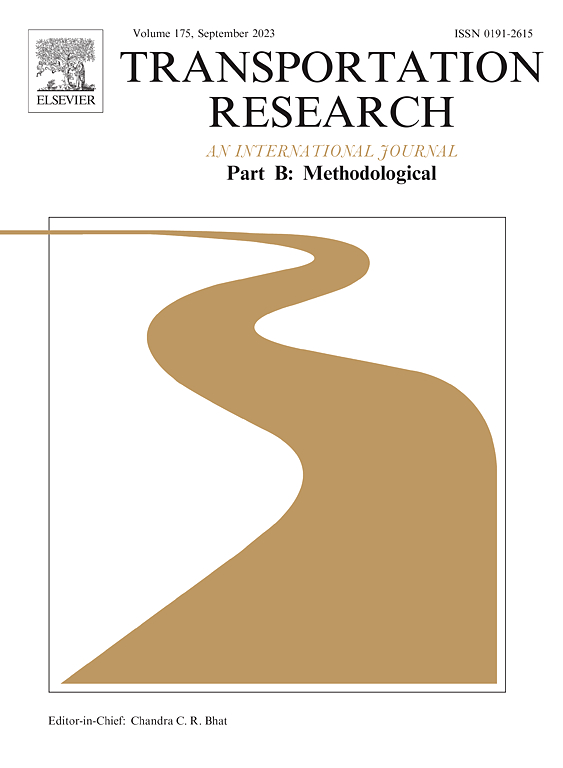Modeling the residual queue and queue-dependent capacity in a static traffic assignment problem
IF 5.8
1区 工程技术
Q1 ECONOMICS
引用次数: 0
Abstract
The residual queue during a given study period (e.g., peak hour) is an important feature that should be considered when solving a traffic assignment problem under equilibrium for strategic traffic planning. Although studies have focused extensively on static or quasi-dynamic traffic assignment models considering the residual queue, they have failed to capture the situation wherein the equilibrium link flow passing through the link is less than the link physical capacity under congested conditions. To address this critical issue, we introduce a novel static traffic assignment model that explicitly incorporates the residual queue and queue-dependent link capacity. The proposed model ensures that equilibrium link flows remain within the physical capacity bounds, yielding estimations more aligned with data observed by traffic detectors, especially in oversaturated scenarios. A generalized link cost function considering queue-dependent capacity, with an additional queuing delay term is proposed. The queuing delay term represents the added travel cost under congestion, offering a framework wherein conventional static models, both with and without physical capacity constraints, become special cases of our model. Our study rigorously analyzes the mathematical properties of the new model, establishing the theoretical uniqueness of solutions for link flow and residual queue under certain conditions. We also introduce a gradient projection-based alternating minimization algorithm tailored for the proposed model. Numerical examples are conducted to demonstrate the superiority and merit of the proposed model and solution algorithm.
静态流量分配问题中剩余队列和队列相关容量的建模
在给定的研究时段(如高峰时段),剩余队列是解决均衡下的交通分配问题时需要考虑的一个重要特征。虽然研究主要集中在考虑剩余队列的静态或准动态流量分配模型上,但它们未能捕捉到在拥塞条件下通过链路的均衡链路流量小于链路物理容量的情况。为了解决这一关键问题,我们引入了一种新的静态流量分配模型,该模型显式地结合了剩余队列和与队列相关的链路容量。所提出的模型确保平衡链路流量保持在物理容量范围内,产生的估计更符合交通检测器观察到的数据,特别是在过饱和的情况下。提出了一种考虑队列相关容量的广义链路代价函数,并增加了排队延迟项。排队延迟项表示在拥塞情况下增加的旅行成本,提供了一个框架,其中传统的静态模型,无论是否有物理容量约束,都成为我们模型的特殊情况。我们的研究严格地分析了新模型的数学性质,建立了在一定条件下链路流和剩余队列解的理论唯一性。我们还介绍了针对所提出的模型量身定制的基于梯度投影的交替最小化算法。通过数值算例验证了所提模型和求解算法的优越性和优点。
本文章由计算机程序翻译,如有差异,请以英文原文为准。
求助全文
约1分钟内获得全文
求助全文
来源期刊
CiteScore
12.40
自引率
8.80%
发文量
143
审稿时长
14.1 weeks
期刊介绍:
Transportation Research: Part B publishes papers on all methodological aspects of the subject, particularly those that require mathematical analysis. The general theme of the journal is the development and solution of problems that are adequately motivated to deal with important aspects of the design and/or analysis of transportation systems. Areas covered include: traffic flow; design and analysis of transportation networks; control and scheduling; optimization; queuing theory; logistics; supply chains; development and application of statistical, econometric and mathematical models to address transportation problems; cost models; pricing and/or investment; traveler or shipper behavior; cost-benefit methodologies.

 求助内容:
求助内容: 应助结果提醒方式:
应助结果提醒方式:


